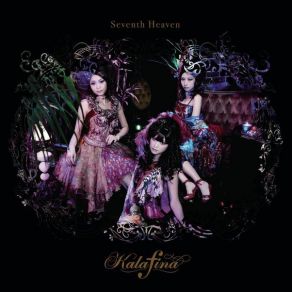Seventh Heaven
Download links and information about Seventh Heaven by Kalafina. This album was released in 2009 and it belongs to Pop genres. It contains 14 tracks with total duration of 01:06:47 minutes.

|
|
|---|---|
| Artist: | Kalafina |
| Release date: | 2009 |
| Genre: | Pop |
| Tracks: | 14 |
| Duration: | 01:06:47 |
| Buy it NOW at: | |
| Buy on iTunes $9.99 | |
| Buy on Amazon $14.29 | |
| Buy on Amazon $9.99 | |
| Buy on Amazon $41.39 | |
| Buy on Songswave €1.88 | |
Tracks
[Edit]| No. | Title | Length |
|---|---|---|
| 1. | Overture | 1:34 |
| 2. | Oblivious | 4:22 |
| 3. | Love Come Down | 4:44 |
| 4. | Natsu No Ringo | 4:02 |
| 5. | Fairytale | 5:13 |
| 6. | Aria | 5:23 |
| 7. | Mata Kaze Ga Tsuyokunatta | 4:56 |
| 8. | Kizuato | 4:39 |
| 9. | Serenato | 4:53 |
| 10. | Ongaku | 5:38 |
| 11. | Ashita No Keshiki | 5:25 |
| 12. | Sprinter | 5:04 |
| 13. | Kimi Ga Hikari Ni Kaeteiku | 4:42 |
| 14. | Seventh Heaven | 6:12 |
Details
[Edit]For an anime credits band, Kalafina stand on their own surprisingly well, with opera-pop that is much heavier on the "pop" part than the "opera" part, but still sounds very enjoyable even without big-eyed visuals to boost the impact. The most evident comparison here is Origa — she of Ghost in the Shell O.S.T. fame: Seventh Heaven has the same kind of dramatic, multi-layered synth pop and dynamic techno beats propping the really powerful (though not exactly opera-level) vocals, delivered, in Kalafina's case, in both solo and chorus performances. The vocals are, in fact, so tight and polished that they sound as artificial as the synthesizers, even though the idea was obviously to contrapose the electronic music and the live singing — but this fits the songs, which are fun precisely due to their otherworldly perfection. The music isn't exactly catchy, but it's not dull, as sometimes happens with vocal-oriented records. Besides, the band goes some length to not lose the listener: "Natsu No Ringo," for instance, uses folk instruments and "Mata Kaze Ga Tsuyokunatta" is a pop-industrial number with a gritty guitar. However, this is not enough to keep the thrill level high throughout the whole album, which clocks in at well over an hour, and so after a while it's possible to discern that Seventh Heaven, for all its epic and noble aspirations, is rooted in the lowly '80s and '90s dance-pop of 2 Unlimited and Erasure, although it is to those bands what a TIE fighter would be to Sputnik 1. Moreover, for all its evolutionary achievements, Seventh Heaven has lost the base animal catchiness of classic techno, and so it's not as memorable as it could be — though it has still a lot of fun to offer.